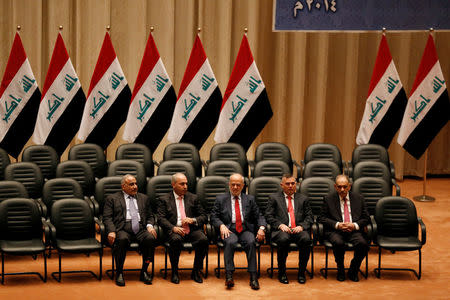Iraq minister faces questions over trade corruption allegations
BAGHDAD (Reuters) - Iraq's parliament on Tuesday questioned acting Trade Minister Salman al-Jumali over corruption allegations linked to the ministry, mostly stemming from a deal to import Indian rice in 2016. The minister, a Sunni Muslim in a government dominated by Shi'ites, was questioned by lawmaker Alia Nussayif and denied any wrongdoing by the ministry. Allegations included importing and distributing contaminated rice and questionable licences for new wheat mills that went against regulations for the subsidy programme. Jumaili told the parliament that of the 40,000-tonne rice cargo in question, only 4,000 tonnes were infected by a bug, and that quantity was rejected and funds for it returned, parliament sources said. Nussayif said that the cargo, which was distributed to the Iraqi market, was dangerous to public health and had to be fumigated three times. Parliament said it would continue discussing the issue in future sessions. Iraq, a major rice and wheat importer, has previously faced graft accusations connected to its trade ministry, which purchases strategic commodities. The trade ministry has been struggling to import grains for its food subsidy programme this year after introducing new payment and quality terms that kept traders away from its international tenders. In May, the cabinet authorised the ministry to make direct purchases of wheat and rice to guarantee food security, a reflection of its struggle to garner enough interest through its tender process. Iraq is expected to produce around 250,000 tonnes of rice this year suggesting an import gap of around 1 million tonnes. Prime Minister Haidar al-Abadi has promised to tackle corruption in a political system that doles out positions along ethnic and sectarian lines, creating powerful patronage networks. (Writing By Maha El Dahan, editing by David Evans)

 Yahoo News
Yahoo News 

